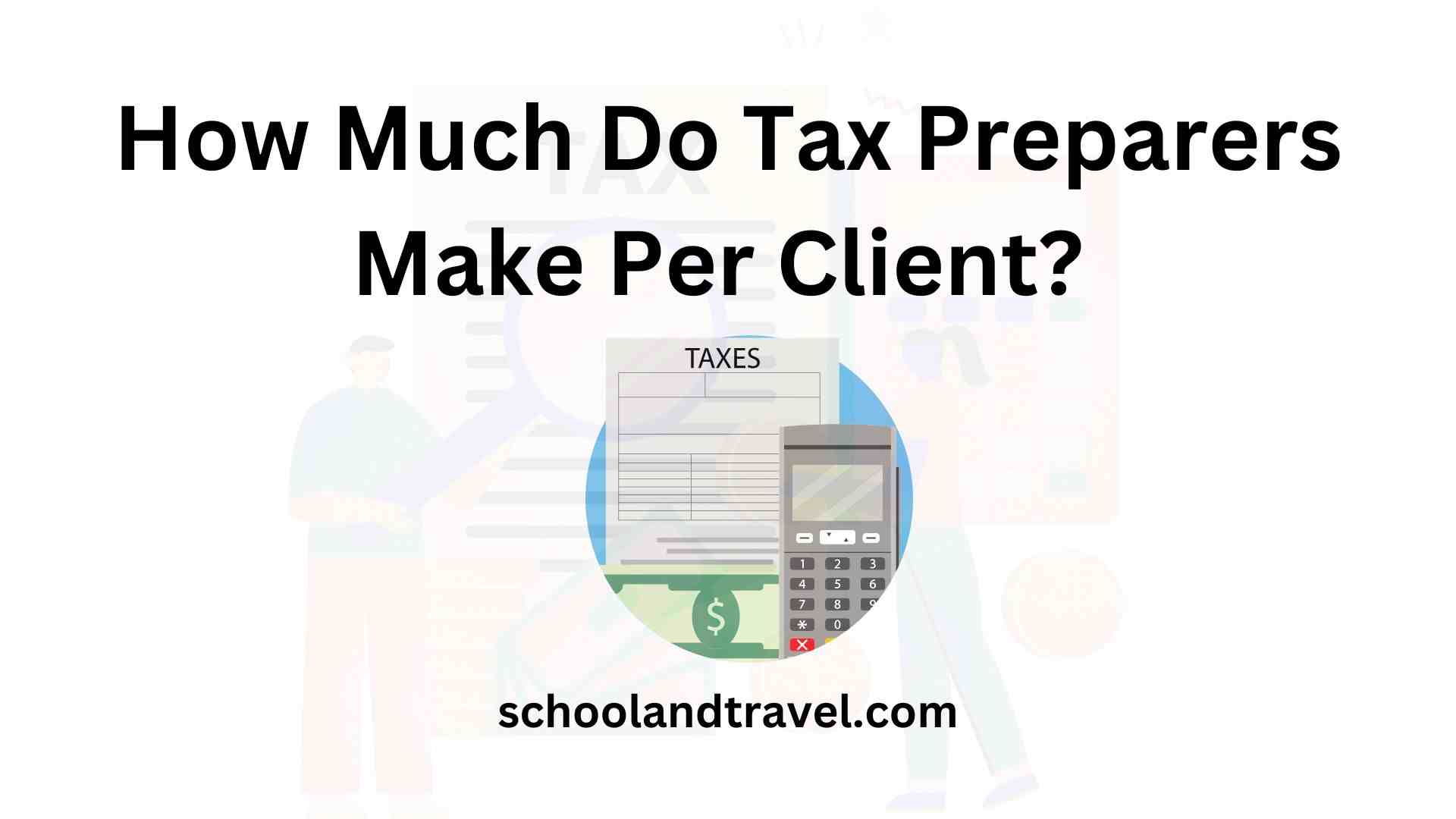A tax accountant, also known as a tax preparer, assists clients in filing their tax returns, calculating their owed taxes, and claiming the highest possible refund.
Their job description includes conducting client interviews, performing account audits, and mediating between clients and the IRS.
This article will illuminate a wide range of topics related to tax preparers, including salary, job description, qualifications, and skill sets.
What does a Tax Preparer do?
Generally speaking, tax preparation entails drafting tax returns (often income tax returns) for someone other than the taxpayer in exchange for payment.
Financial institutions employ tax preparers to offer clients individualized tax advice and file tax returns. They ensure the client’s financial well-being by filing accurate tax returns on their behalf.
The tax preparer reviews the client’s prior tax returns and gathers any new information that may be relevant to determine the client’s tax obligation.
They advise customers on how to prepare their taxes for the future and keep them informed of pending tax filing and payment deadlines.
A tax preparer manages an individual’s tax records or an organization’s financial data, including distributing W-2 forms to workers.
Responsibilities and Duties Of A Tax Preparer
Tax preparers conduct a wide range of accounting, customer service, and organizational duties to ensure the financial stability of their clients or employers.
They are responsible for doing many things, such as:
- Teaching businesses and individuals how to file their taxes
- Gathering all pertinent financial documents, such as salary checks and annual reports
- Completing one’s tax return by entering information from financial documents
- Calculating deductions and determining each client’s net payment or gain on the return by applying relevant federal, state, and local tax legislation
- Filling out tax forms and filing them with the Internal Revenue Service (IRS), state, and municipal governments
- Representing clients before the appropriate authorities
- Developing connections with clients to advertise and grow the business
How To Become A Tax Preparer
The position of Tax Preparer expects candidates to complete courses in tax preparation, accounting, bookkeeping, company finance, and other relevant disciplines, in addition to holding a high school diploma or equivalent.
Individuals with a high school diploma and some on-the-job training may qualify for employment that only requires the completion of basic tax returns.
Multi-national firms typically require tax return preparers to have a bachelor’s degree in accounting, finance, or a related discipline.
Prior federal, state and local tax law training may be indicated by completing federal and state examinations and obtaining certification or licensure.
Qualifications and Skills To Become A Tax Preparer
Tax preparers apply their interpersonal skills, technical expertise, and industry knowledge to ensure they comprehensively and correctly file returns on time. Such qualifications and skills include:
- Expertise in all aspects of tax filing, reporting, and compliance
- Familiarity with typical office suites such as word processors, spreadsheet programs, and tax software
- Familiarity with filing and verifying tax returns, including using the IRS and other government websites.
- Superior customer service abilities, especially the ability to adapt to changing circumstances
- Superb organizational skills, including the aptitude to set priorities and plan ahead
- Excellent verbal and written communication abilities
- Exceptional focus on detail
Experience Requirements To Become A Tax Preparer
To be considered for the position of Tax Preparer, candidates should have a high school diploma or GED and one or two years of work experience in customer service, administrative assistance, accounting, or a related profession.
Some applicants may have only worked one or two tax seasons before the current one.
Candidates with relevant expertise, such as tax preparation, may have worked in the industry for three years or more.
Candidates with CPA expertise have demonstrated a deeper understanding of accounting standards and tax auditing procedures.
How Much Do Tax Preparers Make?
A tax preparer earns a typical hourly wage of $16.45. Factors such as years of experience, education, qualifications, and region may change the salary range.
Factors That Determine How Much Tax Preparers Make Per Client
1. Types of Services
Tax preparers may provide services for their customers, including:
1. Simple tax filing:
Preparing a personal or corporate tax return entails using the IRS’s standard forms and schedules, specifically Form 1040 for personal tax returns and Form 1120 for corporate tax returns.
This service may cost between $50 and $300, depending on the complexity of the paperwork and the number of clients.
2. Deductions by Item:
Figuring out how much money can be saved on taxes by claiming things like mortgage interest, medical bills, charitable donations, and so on.
This service may require an additional $50 to $100 per client, depending on the complexity of the deductions and the paperwork required.
3. Tax credits:
Determining which tax credits, such as the earned income credit, child tax credit, education credit, etc., are applicable and then filing the necessary paperwork to claim them is involved.
The price per client may increase by $50 to $100, depending on the number of credits and the requirements.
2. Complexity of the Tax Situation
Tax preparers may adjust their prices higher or lower depending on the complexity of their client’s tax situations. The following factors may affect complexity:
1. Income amount and distribution:
Clients with more than one source of income (wages, self-employment income, interest, dividends, capital gains, rental income, etc.) may have more complex tax returns.
A tax preparer may charge extra if clients have several or unusual sources of income.
2. Quantity and variety of deductions and credits:
Clients with several deductions and credits to claim may find it more challenging to complete their tax returns than those with fewer or no such claims.
Your tax preparer may charge you extra if you have a lot of deductions and credits, especially if they are unusual.
3. The filing status and dependents:
A client’s filing status (single, married filing jointly, married filing separately, head of household, etc.) can cause tax regulations and rates to vary.
Clients who have dependents may have special tax considerations and credits. The tax preparer may charge a higher fee if a customer has additional dependents or a more complicated filing status.
3. Location of Client
Tax preparation service prices may vary widely from one area to another.
4. Experience and Credentials of Tax Preparer
One professional might charge significantly different prices for tax preparation services than another. The following may affect the relevant work experience and academic credentials:
1. Training and schooling:
Clients can pay extra for tax preparation services from tax preparers who possess more education and training in accounting, finance, or taxes, such as individuals who hold a degree, a certificate, or a license.
A tax preparer who takes the time to remain current on the tax rules and regulations by, for example, enrolling in continuing education classes or attending seminars may be able to charge more for their services.
2. Accreditation and certification:
Certified tax preparers, such as certified public accountants (CPAs), enrolled agents (EAs), and accredited business accountants (ABAs), may charge higher fees compared to those without any credentials.
Tax preparers of the National Association of Tax Professionals (NATP) or the National Society of Accountants (NSA) may charge higher rates than those not affiliated with these organizations.
Frequently Asked Questions (FAQs) on How Much Do Tax Preparers Make Per Client
The Certified Public Accountant (CPA) credential can be used by any Accountant who has met the necessary standards for certification, in contrast to the specialized job of a Tax Preparer.
Individuals can operate as CPAs or as part of a firm to provide accounting advice to corporations and individuals respectively. Although some tax preparers may possess the CPA designation, it is unnecessary. Tax Preparers specialize in taxes, while CPAs can take on broader accounting duties, such as ensuring their clients comply with record-keeping regulations and balancing the books.
Tax preparer spends most of their day sitting at a desk, examining financial reports, and filling out paperwork. They request and fill out relevant IRS paperwork to file tax returns for their customers.
Through in-person consultations, tax preparers and their customers might yield useful information regarding client record-keeping habits and overlooked deductions. Tax preparers search the code for loopholes and credits that may increase their customers’ refunds. They attest their client’s tax documents, send them off to the IRS, and keep their clients apprised of the progress of the return.
Detail-oriented people who thrive on regularity and have the innate mathematical ability to fill out tax forms accurately make good tax preparers. They organize themselves exceptionally well, to the point where they can recall exactly where they placed a specific form, receipt, or account report. A tax preparer can still help customers who need to maintain good financial records by collecting the necessary information. They offer sound and strategic advice on altering future operations to save money on taxes and streamline accounting processes.
Payscale reports that tax preparers earn $73,000 annually at the 90th percentile.
Conclusion
Tax preparers may set prices differently based on several criteria, including the client’s location, the complexity of their tax position, the expertise and qualifications of the preparer, and the sort of service provided. The BLS states that tax preparers earn a median yearly salary of $51,080.
However, individual clients and tax professionals’ tax situations may greatly fluctuate this number. Therefore, customers and tax preparers must do their homework and negotiate rates before hiring a tax preparation service.
Awesome one; I hope this article answers your question.
Editor’s Recommendations:
- Is Investment Bankers/Brokers/Service A Good Career Path?
- Is Recreational Products/Toys a Good Career Path?
- Do Dentists Go To Medical School? (Career Path, FAQs)
- Why Marketing is a Good Career Path? (FAQs)
- Is Movies/Entertainment A Good Career Path? (FAQs)
- Is Broadcasting A Good Career Path? (Meaning, FAQs)
- Is Other Specialty Stores A Good Career Path? (FAQs)
If you find this article good, please share it with a friend.




